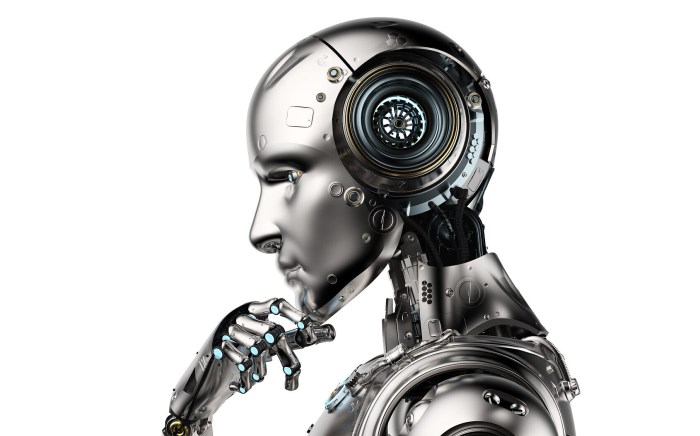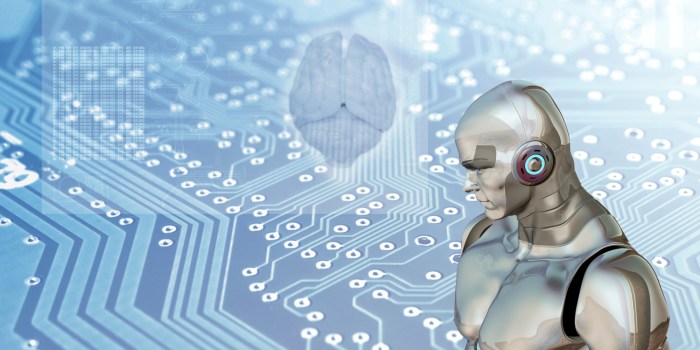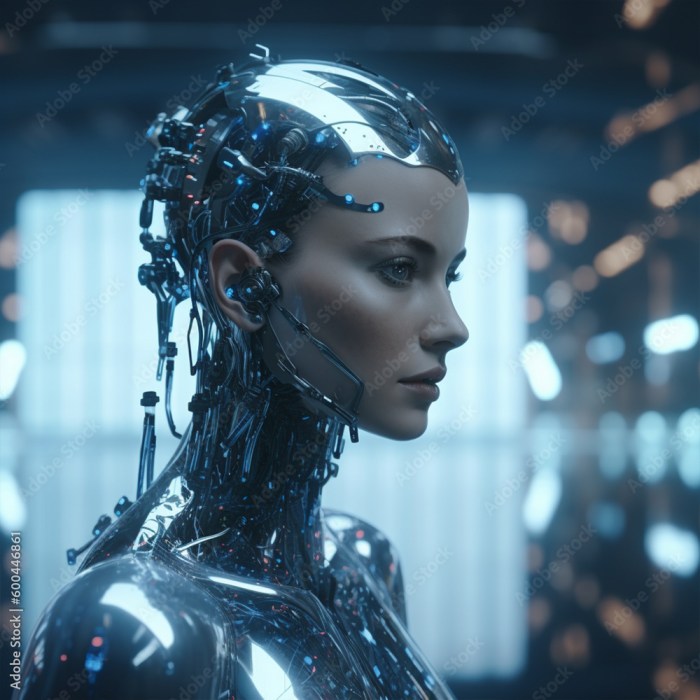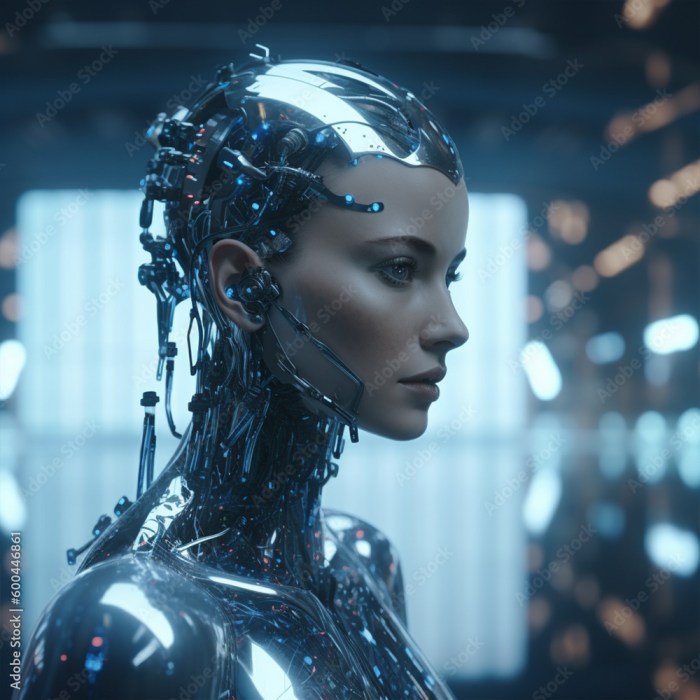Picture this: robots taking over your job, AI writing your next bestseller, and algorithms predicting your every move. Sounds like a sci-fi movie, right? Well, it’s not just Hollywood anymore. Automation and AI are changing the game, and we’re all players in this new reality.
From self-driving cars to personalized medicine, these technologies are shaping our world faster than you can say “Siri.” But how do we, the humans, make sense of it all? Buckle up, because we’re about to take a wild ride through the future of work, ethics, and the very essence of what it means to be human in an increasingly automated world.
This exploration dives into the heart of the automation and AI revolution, examining the impact on industries, the ethical dilemmas, and the human skills that will be crucial for navigating this brave new world. We’ll explore how humans can collaborate with AI to unlock new possibilities, and how we can adapt to thrive in a world where machines are becoming more and more like us.
Get ready to question everything you thought you knew about the future, because the lines between human and machine are blurring, and the future is here.
The Human Element in Automation and AI

The rise of automation and artificial intelligence (AI) is changing the way we work and live. These technologies are automating tasks that were once performed by humans, leading to increased efficiency and productivity. However, this transformation also raises important questions about the future of work and the role of humans in a world increasingly dominated by machines.
The Impact of Automation and AI on Work
Automation and AI are impacting various industries, from manufacturing to healthcare, finance, and transportation. Here are some examples:
- Manufacturing:Robots are increasingly used in factories to perform repetitive tasks, such as welding, painting, and assembly. This has led to increased productivity and reduced labor costs.
- Healthcare:AI-powered systems are being used to diagnose diseases, analyze medical images, and personalize treatment plans. This can help doctors make more informed decisions and improve patient outcomes.
- Finance:AI algorithms are used to detect fraud, manage investments, and provide financial advice. This can help financial institutions improve efficiency and reduce risk.
- Transportation:Self-driving cars are being developed and tested, which could revolutionize transportation and reduce accidents. This could lead to a decrease in the need for human drivers.
Ethical Implications of Automation and AI
The increasing use of automation and AI raises several ethical concerns.
Trying to wrap our heads around AI is like trying to remember if the Monopoly man has a monocle or not. It’s a total mind-bender, and sometimes it feels like the rules of reality are changing right before our eyes.
The Mandela Effect, as explained in The Mandela Effect Mind-Bending Reality (Bleeding Edge Knowledge) , makes us question everything we thought we knew. But just like the game of Monopoly, AI is here to stay, and we’ve gotta learn to play by its rules, or risk being left behind.
Job Displacement
One of the most pressing concerns is job displacement. As machines become more capable of performing tasks previously done by humans, there is a risk that some jobs will become obsolete. This could lead to unemployment and economic inequality.
So, you’re wondering how we humans are gonna handle all this AI and automation stuff, right? It’s like, robots are taking over and we’re all gonna be out of jobs! But hey, maybe we can learn a thing or two from them.
Download And Listen Here to get a glimpse into the future of human-machine interaction and how we can all navigate this wild ride together. Maybe we’ll even learn to be better humans in the process!
“The automation of jobs is a major challenge, and it’s important to think about how we can prepare for it. We need to invest in education and training programs that equip people with the skills they need for the jobs of the future.”
Bill Gates
Algorithmic Bias
Another ethical concern is algorithmic bias. AI systems are trained on data, and if that data is biased, the AI system will also be biased. This can lead to discriminatory outcomes, particularly in areas like hiring, lending, and criminal justice.
“It is important to ensure that AI systems are fair and unbiased. We need to develop mechanisms to identify and mitigate bias in AI algorithms.”
Andrew Ng
Making Sense of Automation and AI
The rise of automation and artificial intelligence (AI) is transforming the world around us, from how we work to how we live. While these technologies offer incredible opportunities for progress, they also raise important questions about the future of work and the role of humans in a rapidly evolving world.
This section explores how humans can best adapt to this new landscape, focusing on the skills and qualities that will be most valuable in the future workforce, and showcasing how humans and AI can collaborate effectively.
The Skills and Qualities for the Future Workforce
The future workforce will require a unique blend of skills and qualities that bridge the gap between human ingenuity and AI capabilities. These skills go beyond technical expertise and encompass adaptability, creativity, and emotional intelligence.
- Critical Thinking and Problem-Solving:AI can process vast amounts of data, but it still needs human guidance to interpret the information and make sound decisions. Critical thinking skills will be crucial for identifying patterns, analyzing complex problems, and developing innovative solutions.
- Creativity and Innovation:While AI can automate repetitive tasks, it struggles with tasks that require imagination and creativity. Humans will be essential for generating new ideas, developing novel concepts, and pushing the boundaries of what’s possible.
- Adaptability and Lifelong Learning:The world of work is constantly changing, and the ability to adapt to new technologies and challenges will be paramount. Lifelong learning will be essential for staying ahead of the curve and acquiring the skills needed for the future workforce.
- Collaboration and Communication:Effective collaboration between humans and AI is crucial for leveraging the strengths of both. Humans will need to be able to communicate their ideas clearly, work effectively in teams, and understand the nuances of AI systems.
- Emotional Intelligence:While AI excels at processing data, it lacks the emotional intelligence that is essential for building relationships, understanding human motivations, and navigating complex social situations. Humans will play a vital role in these areas, ensuring that AI is used ethically and responsibly.
Collaboration in the Workplace
Imagine a future where AI and humans work together seamlessly in a healthcare setting. Let’s consider a hypothetical scenario involving a team of doctors, nurses, and AI-powered diagnostic tools.
It’s crazy how AI is changing the game, man. We’re talking about robots writing novels, coding apps, and even running businesses! It’s like something out of a sci-fi movie, but it’s real, and it’s happening now. Some people are even figuring out how to make bank off of it, like with the GPT Chat Become a Millionaire Capture the AI GPT Chat Market and Become a Millionaire strategy.
So yeah, it’s wild, but it’s also a whole new world of possibilities for anyone who’s willing to jump in and ride the wave.
- AI-Powered Diagnostics:AI systems can analyze medical images, patient records, and genetic data at a speed and accuracy that surpasses human capabilities. They can quickly identify potential health issues and suggest personalized treatment plans.
- Human Expertise:Doctors and nurses bring their expertise in patient care, understanding the emotional and social aspects of healthcare, and making nuanced judgments based on their experience.
- Collaborative Decision-Making:In this scenario, AI systems provide doctors and nurses with valuable insights, while human professionals use their judgment and experience to interpret the data and make informed decisions. This collaboration leads to better diagnoses, more effective treatment plans, and improved patient outcomes.
It’s wild, right? Robots doing our jobs, AI writing our songs… it’s like we’re living in a sci-fi movie! But amidst all this change, we gotta remember to keep our cool. If you’re feeling overwhelmed by the future, check out Stop Overthinking A Step-by-Step Guide to Master Your Emotions with 49 Powerful Motivational Quotes to Unlock Your Potential for some serious self-help vibes.
Maybe with a little inner peace, we can navigate this crazy world of automation and AI with a smile on our faces.
Book Review: Exploring the Intersection of Humanity and Automation

This book review delves into the fascinating world of “The Second Machine Age: Work, Progress, and Prosperity in a Time of Brilliant Technologies” by Erik Brynjolfsson and Andrew McAfee. This book explores the intersection of humanity and automation, examining the transformative impact of artificial intelligence and automation on our work, economy, and society.
It’s a must-read for anyone who wants to understand the future of work and the challenges and opportunities that lie ahead.
Comparing and Contrasting Perspectives on Automation and AI
The authors argue that we are currently living through a period of rapid technological advancement, similar to the first Industrial Revolution. They believe that the rise of AI and automation will lead to significant economic and societal changes, including job displacement and increased productivity.
| Perspective | “The Second Machine Age” | My Insights |
|---|---|---|
| Impact on Jobs | AI and automation will displace some jobs but also create new ones. | While job displacement is a concern, the creation of new jobs in areas like AI development and data analysis is also a possibility. |
| Economic Growth | AI and automation have the potential to boost economic growth, but this growth may not be evenly distributed. | The benefits of AI and automation need to be shared more equitably to ensure a prosperous future for all. |
| Social Impact | AI and automation could lead to increased inequality and social unrest if not managed effectively. | We need to address the potential negative social consequences of AI and automation, such as job displacement and widening inequality. |
The Book’s Overall Message and Implications for the Future
The book’s overarching message is that we need to prepare for the challenges and opportunities presented by the rise of AI and automation. The authors advocate for policies that promote innovation, education, and social safety nets to ensure that everyone benefits from these technological advancements.
“The Second Machine Age is not just about technology. It’s about how we, as a society, choose to shape the future.”
Erik Brynjolfsson and Andrew McAfee
The book’s implications for the future of work and society are profound. It highlights the need for lifelong learning, adaptability, and collaboration between humans and machines. We need to invest in education and training programs that equip workers with the skills needed for the jobs of the future.
Closing Notes

So, what’s the bottom line? As we navigate the ever-evolving landscape of automation and AI, it’s clear that the future is a collaboration between humans and machines. We need to embrace the power of AI while remembering the unique strengths and creativity that make us human.
The future isn’t about robots replacing us; it’s about humans and machines working together to achieve amazing things. It’s a future where our imaginations are the limit, and the possibilities are endless. Let’s get ready to rock this future together, one innovation at a time.
Expert Answers
What are some specific examples of industries where automation and AI are making a big impact?
Think manufacturing, healthcare, transportation, finance, and even customer service! From robots assembling cars to AI diagnosing diseases, these technologies are transforming how we work and live.
How can I learn more about the ethical implications of AI?
Check out books, articles, and documentaries that explore the ethical challenges of AI, like algorithmic bias, privacy concerns, and the potential for job displacement. It’s important to have these conversations and shape the future of AI responsibly.
What are some skills that will be valuable in the future workforce?
Think critical thinking, problem-solving, creativity, adaptability, and emotional intelligence. These human skills will be essential for collaborating with AI and navigating a rapidly changing world.

